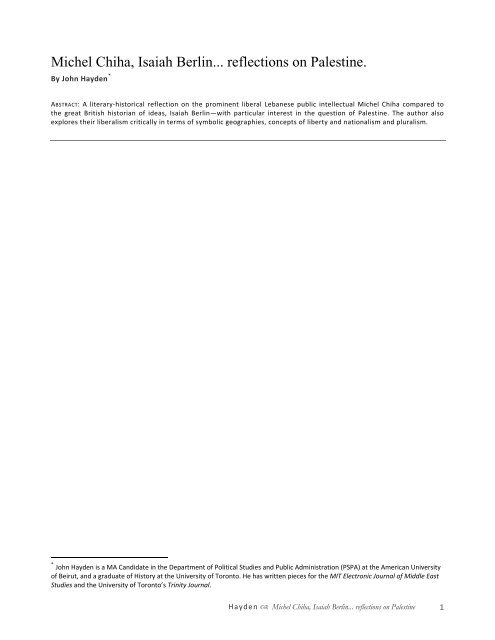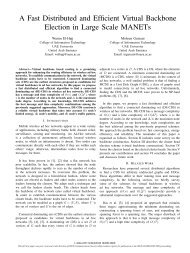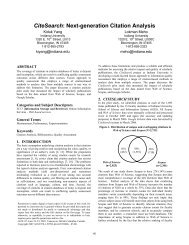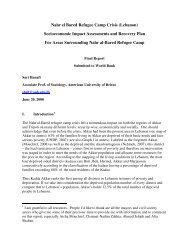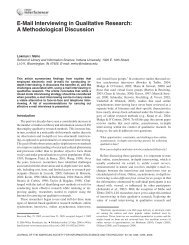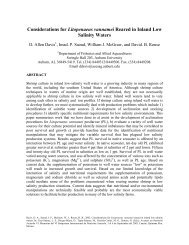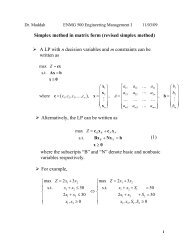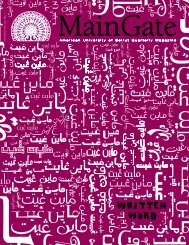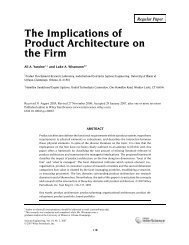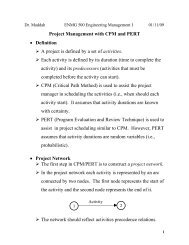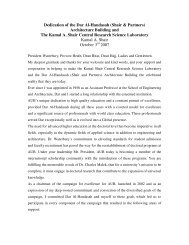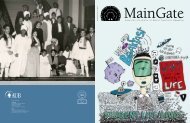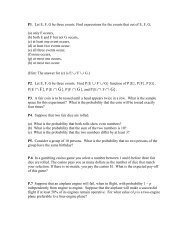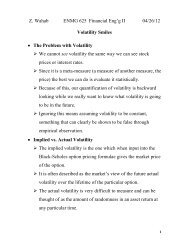Berlin, Chicha - American University of Beirut
Berlin, Chicha - American University of Beirut
Berlin, Chicha - American University of Beirut
Create successful ePaper yourself
Turn your PDF publications into a flip-book with our unique Google optimized e-Paper software.
Michel Chiha, Isaiah <strong>Berlin</strong>... reflections on Palestine.<br />
By John Hayden *<br />
ABSTRACT: A literary‐historical reflection on the prominent liberal Lebanese public intellectual Michel Chiha compared to<br />
the great British historian <strong>of</strong> ideas, Isaiah <strong>Berlin</strong>—with particular interest in the question <strong>of</strong> Palestine. The author also<br />
explores their liberalism critically in terms <strong>of</strong> symbolic geographies, concepts <strong>of</strong> liberty and nationalism and pluralism.<br />
* John Hayden is a MA Candidate in the Department <strong>of</strong> Political Studies and Public Administration (PSPA) at the <strong>American</strong> <strong>University</strong><br />
<strong>of</strong> <strong>Beirut</strong>, and a graduate <strong>of</strong> History at the <strong>University</strong> <strong>of</strong> Toronto. He has written pieces for the MIT Electronic Journal <strong>of</strong> Middle East<br />
Studies and the <strong>University</strong> <strong>of</strong> Toronto’s Trinity Journal.<br />
Hayden � Michel Chiha, Isaiah <strong>Berlin</strong>... reflections on Palestine 1
I.<br />
“Ce que nous voulons exalter, c’est la dignité de l’homme.” // that which we would exalt is<br />
the dignity <strong>of</strong> man. // ~Michel Chiha, “Sur la liberté,” Essais, v. 1, p. 213.<br />
The Palestinian resistance will continue no matter what we write about it. In the summer <strong>of</strong><br />
2005, I had the opportunity to study at Birzeit <strong>University</strong> near Ramallah in Israel’s Occupied<br />
Palestinian Territories. Of course, I was horrified by the construction <strong>of</strong> the wall, the annexation <strong>of</strong><br />
land, the checkpoints, the daily, sometimes hourly harassment <strong>of</strong> innocent people by the Israeli<br />
army, the constant surveillance—the dehumanizing ‘matrix <strong>of</strong> control’ Israel exerts in order to<br />
ensure the dominance <strong>of</strong> an expansionist regime <strong>of</strong> some three hundred thousand illegal settlers in<br />
the West Bank. But more than this common outrage, I also left with an unmistakable impression <strong>of</strong><br />
the entrenched, inspiring, imperfect, relentless dignity <strong>of</strong> the Palestinian people. That being said,<br />
geographical Palestine is fast disappearing—like the evaporating inkblots on the inset <strong>of</strong> Elyas<br />
Khoury’s Gate <strong>of</strong> the Sun—and with it, the last hope <strong>of</strong> the two‐state solution.<br />
This summer, a conference at York <strong>University</strong> in Canada will attempt to revisit the question<br />
<strong>of</strong> partition. To support their vision, the conference organizers invoked the liberal outlook <strong>of</strong><br />
humanist Jewish intellectuals such as Martin Buber and Judah Leon Magnes as proponents <strong>of</strong> a<br />
one‐state solution. Perhaps this was also part <strong>of</strong> a strategy to negotiate the conference’s public<br />
legitimacy in a politically volatile and polarized academic environment, fraught as it is with endless<br />
accusations <strong>of</strong> anti‐Semitism and ideological bias. 1 Here, the haunting <strong>of</strong> present‐day politics by the<br />
ghosts <strong>of</strong> the past reminds us <strong>of</strong> “the sites <strong>of</strong> trauma, memory, remediation, and the fracturing <strong>of</strong><br />
temporality” 2 that is increasingly part <strong>of</strong> our attempts to understand and reckon with the question<br />
<strong>of</strong> Palestine. From our vantage here in Lebanon, at the <strong>American</strong> <strong>University</strong> <strong>of</strong> <strong>Beirut</strong>, I suppose we<br />
have some <strong>of</strong> our own liberal ghosts to deal with. In true Anglo‐<strong>American</strong> style, as a history <strong>of</strong><br />
ideas, and because both <strong>of</strong> their positions regarding Palestine are problematic in their own way, I<br />
propose that we now confront the specters <strong>of</strong> Michel Chiha and Isaiah <strong>Berlin</strong>.<br />
Hayden � Michel Chiha, Isaiah <strong>Berlin</strong>... reflections on Palestine 2
II.<br />
The reasons that would compel us to compare Michel Chiha to Isaiah <strong>Berlin</strong> are surprisingly<br />
numerous. Both men are widely seen as liberal intellectuals tied inextricably to the public<br />
conversations and politics <strong>of</strong> their time. They both wrote essays on liberty. They loved poetry,<br />
culture and rational conversation, reveled in cosmopolitan milieus, and inspired those who knew<br />
them by their captivating intelligence. Both were born into socially conservative, minority<br />
communities (Orthodox‐Jewish Latvian and Chaldean‐Christian Lebanese, respectively) to wealthy<br />
families active in commercial trade. 3 When the late Edward Said writes <strong>of</strong> the exilic imagination<br />
produced by the displacement <strong>of</strong> intellectuals, 4 we might also recall that Michel Chiha evaded<br />
Ottoman conscription during the First World War by re‐locating to the relative safety <strong>of</strong> British<br />
colonial Egypt—with Bchara el‐Khoury, Yousef el‐Sawda and the grand liban national architects in<br />
exile. 5 Meanwhile, Isaiah <strong>Berlin</strong> had fled Latvia with his parents, in the early years <strong>of</strong> the Russian<br />
revolution, to settle in London. There, he eventually attained a storied donship and pr<strong>of</strong>essorship<br />
at Oxford, consorted with the likes <strong>of</strong> Bertrand Russell, W. H. Auden and T.S. Eliott and built his<br />
reputation as a brilliant historian <strong>of</strong> ideas renowned for his encyclopedic knowledge.<br />
Samir Khalaf tells us, in his introduction to the English translations <strong>of</strong> Michel Chiha’s Le Jour<br />
editorials (1945‐1954) that Chiha also had occasion to study in England. The sense he gained there<br />
<strong>of</strong> the “resilience <strong>of</strong> the unwritten British constitution,” Khalaf argues, would come to inform his<br />
participation in the drafting <strong>of</strong> the Lebanese constitution <strong>of</strong> 1926. 6 His collected writings indicate<br />
how closely Chiha followed British politics, with particular attention to the matter <strong>of</strong> Jewish<br />
settlement in mandatory Palestine. His knowledge <strong>of</strong> prominent Oxford lecturers and historians<br />
such as Cyril Falls suggests that Chiha might have heard <strong>of</strong> Isaiah <strong>Berlin</strong>, one <strong>of</strong> the young rising<br />
stars <strong>of</strong> All Souls College. 7<br />
There were also many differences between the two. Chiha was the picture <strong>of</strong> perfect<br />
Francophile politesse, <strong>Berlin</strong>, the “patron saint <strong>of</strong> untidiness.” 8 On issues such as free trade, the<br />
family, and law and order, Chiha represented the ‘conservative’ Burkean side <strong>of</strong> liberalism, while<br />
<strong>Berlin</strong> embodied more <strong>of</strong> the modern, left‐leaning liberal outlook which “tended to vote Labour<br />
and supported Roosevelt’s New Deal.” 9<br />
Hayden � Michel Chiha, Isaiah <strong>Berlin</strong>... reflections on Palestine 3
<strong>Berlin</strong> was knighted by the Queen in 1957 for his services to conversation, 10 but in Lebanon,<br />
Chiha was no less a national treasure who “filled the whole country with his strong personality.” 11<br />
“Our relief,” wrote Charles Helou, the fourth President <strong>of</strong> Lebanon, “was to be able to compare this<br />
Lebanese, for his spirit and character, to the greatest <strong>of</strong> this world and <strong>of</strong> our times...” 12 And so it<br />
would certainly follow in the spirit <strong>of</strong> Helou’s words to compare Michel Chiha and Isaiah <strong>Berlin</strong>.<br />
Most importantly for our present purposes, their diverging opinions about the question <strong>of</strong><br />
Palestine should encourage us to draw a critical distinction between pr<strong>of</strong>essed liberal values and<br />
real politics, which I shall attempt to explore in the latter part <strong>of</strong> this essay. But let us first begin<br />
with dialogue on geographies and on liberty and nationalism, in order to set the stage, as it were,<br />
as Hamlet enjoins the Ghost; “come let us go together.” 13<br />
�<br />
On geographies<br />
At age twenty‐five, Isaiah <strong>Berlin</strong> made a brief visit to Lebanon in the summer <strong>of</strong> 1934. It was<br />
two years before the Arab revolt in Palestine when a forty‐three year‐old Michel Chiha launched<br />
the opposition journal, Le Jour, 14 which would go on to print so many <strong>of</strong> his editorials. 15 Like the<br />
great <strong>American</strong> poet, Robert Frost, <strong>Berlin</strong> “was fascinated by human variety far more than he was<br />
moved by natural beauty” 16 —and yet Henry Hardy’s collection <strong>of</strong> <strong>Berlin</strong>’s correspondence reveals<br />
one notable exception:<br />
…Baalbeck & <strong>Beirut</strong> & the great road South, with the magnificent green slopes <strong>of</strong> the Lebanon on the<br />
left & the Sea on the right—it really is so beautiful that even I who have no eyes was absolutely amazed<br />
& stopped talking… 17<br />
The symbolic geographies <strong>of</strong> the Mountain and the Sea lie at the heart <strong>of</strong> Michel Chiha’s political<br />
philosophy. 18 Even if his reading <strong>of</strong> port cities suggests a radically different conception <strong>of</strong><br />
democracy and the mediterrannie, Rancière also insisted that representational politics persist in<br />
the landscapes that encompass them. 19 Chiha explains his endless draft sketches <strong>of</strong> the nation’s<br />
symbolic geography in his Visage et Presence du Liban, 20 an exhibition <strong>of</strong> ‘becoming’ which<br />
parallels Henri Bergson’s metaphor <strong>of</strong> Paris in infinite photographs, or the urban fragments <strong>of</strong><br />
Venice in Italo Calvino’s enigmatic novella, Invisible Cities. <strong>Berlin</strong> believed pr<strong>of</strong>oundly in the power<br />
<strong>of</strong> ideas to shape the course <strong>of</strong> human history, 21 and so would have been interested in Chiha’s<br />
representations—which always sought out a common national language amidst a plurality <strong>of</strong><br />
Hayden � Michel Chiha, Isaiah <strong>Berlin</strong>... reflections on Palestine 4
Lebanese cultural idioms. Still, <strong>Berlin</strong> would not have accepted a particular essentializing mode that<br />
equated the West with civilization, the sun and the sea, and the East with barbarism, the mountain<br />
and the desert. 22<br />
�<br />
On Liberty and Nationalism<br />
It was the sun <strong>of</strong> a <strong>Beirut</strong> summer that inspired Chiha to pen his essay on liberty. 23 Sur la<br />
Liberté is an exposition on what Isaiah <strong>Berlin</strong> identified as ‘positive liberty’ in his now widely read<br />
1958 inaugural lecture. 24 Chiha writes,<br />
“Ainsi la liberté et la morale, la liberté et la loi, la liberté et la sagesse, la liberté et la justice se<br />
rejoignent et s’équilibrent.” 25<br />
Liberty, for Chiha, is found in the law, as justice is found in order, wisdom in restraint and morality<br />
in discipline. As <strong>Berlin</strong> <strong>of</strong>ten pointed out, ‘positive liberty’ in this sense <strong>of</strong> self‐mastery, at the group<br />
level, can easily lead to political modalities <strong>of</strong> control, discipline and uniformity, which is perhaps<br />
why we see it in Chiha’s articulation <strong>of</strong> Lebanese nationalism. What <strong>Berlin</strong> called ‘negative liberty’,<br />
though, also appears in Chiha’s work. In Plains‐Chants, it is,<br />
“Cette liberté qui est l’honneur de l’espèce et qui permet le bien et le mal… qui donne à l’être<br />
raisonnable un pouvoir souverain…” 26<br />
This passage is reminiscent <strong>of</strong> J.S. Mill’s injunction that the individual should do as he thinks best,<br />
free from the intervention <strong>of</strong> the state or the tyranny <strong>of</strong> the majority. I think it is useful to think <strong>of</strong><br />
Michel Chiha as a champion first <strong>of</strong> ‘positive liberty’, and Isaiah <strong>Berlin</strong> as a champion first <strong>of</strong><br />
‘negative liberty’—although each understood and recognized the implications <strong>of</strong> both modes <strong>of</strong><br />
human freedom<br />
Isaiah <strong>Berlin</strong>’s philosophy rests upon ideas and human agency in history as well as the<br />
complexity and tentativeness <strong>of</strong> human existence—in a lack <strong>of</strong> fundamental moral certainty. Values<br />
are plural; no one utopian moral theory can account for all essentially distinctive desires. Thus a<br />
‘tragedy <strong>of</strong> choice’ exists between multiple incommensurable goods. Liberty, then, must always be<br />
given priority to allow for the necessary deliberations <strong>of</strong> rational conscience.<br />
How can we reconcile <strong>Berlin</strong>’s liberalism with his position on Jewish nationalism? Liberals<br />
are traditionally averse to nationalism because it seems to restrict the political space <strong>of</strong> toleration 27<br />
Hayden � Michel Chiha, Isaiah <strong>Berlin</strong>... reflections on Palestine 5
for those excluded by definition from the national project—read; the Palestinians. Stephen Lukes 28<br />
and Kenan Malik 29 have both reminded us <strong>of</strong> how <strong>Berlin</strong>’s value pluralism “encourages people to<br />
search for differences between them, rather than frame their identities around what they might<br />
have in common.” 30<br />
This moves us closer to what Michel Chiha referred to as “the desire to live together” with<br />
all <strong>of</strong> the tension and conflict <strong>of</strong> incorporation that this desire entails. 31 In classical fashion, Chiha<br />
attempted to give this drive substance through a philosophy <strong>of</strong> civic nationalism that closely<br />
mirrored Ernest Renan’s “plébiscite de tous les jours,” 32 or Jawad Boulos’ “pacte tacite.” 33<br />
Representatives <strong>of</strong> Lebanon’s religiously demarcated communities would come together in the<br />
national assembly not principally as legislators but as a community <strong>of</strong> notables. 34 Chiha saw<br />
Lebanon as a haven for minorities fleeing persecution (a theme <strong>Berlin</strong> would have been<br />
sympathetic to) but the executive powers granted to the Christian President <strong>of</strong> the Republic<br />
through the 1926 constitution reflected a desire to place “final control <strong>of</strong> policy in Christian<br />
hands.” 35 Chiha saw the Christians (in an oligarchic power‐sharing relationship with Sunni business<br />
elites) as the benign guarantors <strong>of</strong> a Lebanese ‘market state’. 36 It is thus the inherent dignity 37 <strong>of</strong><br />
economic man that finds common expression in Chiha’s civic ideology, rather than liberty<br />
conceived in the mode <strong>of</strong> <strong>Berlin</strong>ian humanism—it is, in fact, the classical liberty <strong>of</strong> laissez‐faire<br />
capitalism.<br />
III.<br />
On ghosts<br />
“If I am getting ready to speak about ghosts… it is in the name <strong>of</strong> justice.”<br />
~Jacques Derrida, Specters <strong>of</strong> Marx, EXORDIUM, p. xviii<br />
Imagine Chiha and <strong>Berlin</strong> sitting down to pheasant Provencal under glass, with a bottle <strong>of</strong><br />
that exquisite 1929 Chateau Lafite Rothschild, cigars and newspapers <strong>of</strong> course, and an evening full<br />
<strong>of</strong> discussion in the opulent surrounds <strong>of</strong> Chiha’s villa in Yarzeh. 38 As Lyotard said, “it is impossible<br />
to think or write without some facade <strong>of</strong> a house at least rising up, a phantom, to receive and to<br />
Hayden � Michel Chiha, Isaiah <strong>Berlin</strong>... reflections on Palestine 6
make a work <strong>of</strong> our peregrinations.” 39 Lately I have been imagining such ghostly salon affairs. As<br />
Derrida said, the appearance <strong>of</strong> ghosts <strong>of</strong> the past reminds us <strong>of</strong> “what is no longer present.” 40 But<br />
who could abide such visitations? I am sure, for instance, that the ‘Specter <strong>of</strong> <strong>Berlin</strong>’ would not<br />
scare Elyas Khoury. The sudden appearance <strong>of</strong> the ghost <strong>of</strong> Hannah Arendt, however, would most<br />
certainly cause Tzipi Livni a great deal <strong>of</strong> discomfort. And if the brutal targeting <strong>of</strong> civilians in<br />
wartime by a Jewish army does not sit well with the legacy <strong>of</strong> Adorno or Benjamin, nor would the<br />
humanistic ghosts <strong>of</strong> Magnes or Buber find many friends left amongst the “suburban squires” <strong>of</strong><br />
the new Jerusalem… and all <strong>of</strong> this is to say that Edward Said was right when he proclaimed the<br />
audacious truth that he was the last Jewish intellectual. 41<br />
�<br />
Michel Chiha, Isaiah <strong>Berlin</strong>… reflections on Palestine<br />
“On the whole,” writes <strong>Berlin</strong>’s <strong>of</strong>ficial biographer, Michael Ignatieff, “[<strong>Berlin</strong>] fought the<br />
sentimental undertow <strong>of</strong> identification with Palestine all his life. He was a Zionist—but already he<br />
was troubled by the Zionist myth <strong>of</strong> Palestine as a land without people given to a people without<br />
land.” As an analyst employed by the Foreign Office in WW2, <strong>Berlin</strong>’s Zionism came into conflict<br />
with <strong>of</strong>ficial British policy (most notably the White Paper ban on Jewish immigration in 1941) 42<br />
recalling Chiha’s acerbic remark, “…ne voit‐on pas qu’il devient difficile de rester un bon juif et un<br />
bon anglais en même temps?” 43<br />
Ultimately, <strong>Berlin</strong> declined Chaim Weizmann’s invitation to live in Israel after 1948, and<br />
settled down at Oxford where he became a fixture <strong>of</strong> British public life. From then on he would<br />
defend the right <strong>of</strong> Jews to live in a country where they no longer faced the pressures <strong>of</strong><br />
assimilation or exclusion, but “…he knew he could never be fully at home in Israel.” 44 Indeed, <strong>Berlin</strong><br />
seldom wrote about Zionism directly, claiming that it wasn’t the role <strong>of</strong> Diaspora Jews to comment<br />
on Israeli affairs. 45<br />
Just as Chiha’s cosmopolitanism “stretch[ed] his Lebanese nationalism to the breaking<br />
point,” 46 <strong>Berlin</strong>’s own liberal values had made his ardent Zionism problematic—as revealed in the<br />
comments <strong>of</strong> his close friend, the Croatian pianist, Alfred Brendel. 47 If <strong>Berlin</strong> could castigate T.S.<br />
Eliott for imagining the Jews placed outside <strong>of</strong> the borders <strong>of</strong> the city, 48 then how could he<br />
condone the exile and eviction <strong>of</strong> Palestinians from their homes in 1948? As the years went on,<br />
Hayden � Michel Chiha, Isaiah <strong>Berlin</strong>... reflections on Palestine 7
and the situation proved intractable, <strong>Berlin</strong> continued to place his hope for a peaceful resolution to<br />
the Palestinian‐Israeli conflict in liberal Zionism, and Peace Now. Unfortunately, as Gideon Levy<br />
recently pronounced in Ha’aretz, nothing is left <strong>of</strong> the peace movement in Israel. 49<br />
On the other hand, I believe that Chiha’s prescient analysis—and his stand with the<br />
Palestinians against their dispossessors—will prove to be the version ultimately vindicated by<br />
history. Chiha called for the internationalization <strong>of</strong> Jerusalem, he believed in the territorial integrity<br />
<strong>of</strong> Palestine, and even accepted limited Jewish immigration as a cultural and economic boon to the<br />
region. He accurately predicted that the creation <strong>of</strong> the state <strong>of</strong> Israel would not only harm the<br />
Palestinians, but would usher in an era <strong>of</strong> destabilizing violence, extremism and persecution with<br />
dire consequences for Lebanon as well; “we are the immediate neighbors <strong>of</strong> this ambition and<br />
power,” he wrote in an October 1947 editorial in le Jour. “Jewish intentions can only take their<br />
hoped‐for course by trampling over us.” 50 Still, one question remains: why did Chiha support<br />
Palestine when so many <strong>of</strong> the pro‐Western bankers, adepts <strong>of</strong> free trade, poets, nationalists and<br />
purveyors Phoenician myths were—like Emile Eddé—actively colluding with the Jewish Agency in<br />
an effort to establish a formal Zionist‐Lebanese treaty? 51<br />
Perhaps Chiha feared that Tel Aviv would come to eclipse <strong>Beirut</strong> economically and take its<br />
place as intermediary between the West and its nascent commercial interests in the Middle East. 52<br />
Or, he might have been simply pandering to the “dominant view <strong>of</strong> the Arab‐Israeli conflict<br />
developed among Arab ruling classes” <strong>of</strong> his time, which he had in large part produced through his<br />
own influential writings. 53 Whether he hoped to endear himself to the sources <strong>of</strong> Palestinian<br />
intellectual and financial capital displaced by the Zionist project, or whether his feelings were<br />
actually inspired by a genuine sense <strong>of</strong> social justice, Chiha relied so heavily on the polemical<br />
phantasm <strong>of</strong> a crypto‐Marxist conspiracy <strong>of</strong> wealthy Jews pulling the strings <strong>of</strong> world<br />
governments, 54 that a sympathetic liberal‐humanist reading <strong>of</strong> his Palestine strains credulity. 55 At<br />
least Isaiah <strong>Berlin</strong> would have held him to task for this if they had met in <strong>Beirut</strong>. At the same time,<br />
<strong>Berlin</strong> might have learned directly from the eloquent Michel Chiha, <strong>of</strong> the “disaster on its way” 56 if<br />
the Jewish state was to antagonize Islamic constituencies, disrupt the coastal political economy,<br />
and in so doing threaten the stability <strong>of</strong> Chiha’s Lebanese constitutional order.<br />
�<br />
Hayden � Michel Chiha, Isaiah <strong>Berlin</strong>... reflections on Palestine 8
Among the dead cities<br />
Where does a liberal stand in the aftermath <strong>of</strong> the latest IDF military assault on Gaza? Here,<br />
liberal philosophy has given way to real politics; the unchecked militarism <strong>of</strong> a “rogue state,” as Avi<br />
Shlaim made clear in his January 2009 Guardian op‐ed, continues to oppress its occupied<br />
population and threaten regional and global stability. 57 At the domestic level, the resurgence <strong>of</strong><br />
Benyamin Netanyahu and his Jabotinskian vision <strong>of</strong> the ‘iron wall’, the power <strong>of</strong> Avigdor Lieberman<br />
and his neo‐fascist Israel Beiteinu, the utter collapse <strong>of</strong> the Israeli peace movement, and the<br />
development <strong>of</strong> an ever more brutal Israeli technological machinery <strong>of</strong> war brought to bear against<br />
the divided Palestinian people… all <strong>of</strong> this heralds the endgame <strong>of</strong> the disaster Chiha foretold sixty<br />
years ago. The ‘bent twig’ <strong>of</strong> Zionism now more closely parallels that “pathological nationalism”<br />
that <strong>Berlin</strong> described in a 1972 Thames Television discussion with Stuart Hampshire 58 —but would<br />
never admit could be true <strong>of</strong> Jewish nationalism. 59 And yet his warning resonates, that “all divisions<br />
in a sense carry with them potential dangers <strong>of</strong> collision <strong>of</strong> an irrational kind,” and while<br />
nationalism, according to <strong>Berlin</strong>, is yet one more “ordinary” aspect <strong>of</strong> human diversity and variety,<br />
it so <strong>of</strong>ten leads to violent confrontation, to fanaticism, to “death [and] suffering…” 60 And so,<br />
where A.C. Grayling encourages us to consider the morality <strong>of</strong> bombing civilians in wartime from<br />
the vantage <strong>of</strong> fire‐ravaged Dresden in his Among the Dead Cities, or Raimond Gaita from<br />
Hiroshima and Nagasaki, 61 reading Michel Chiha’s Palestine should leave us now walking in the<br />
wreckage <strong>of</strong> the crowded slums <strong>of</strong> Gaza, in the aftermath <strong>of</strong> Israel’s latest campaign <strong>of</strong> barbarism<br />
against the Palestinian people in 2008. At least we know that there can be no liberty, no flourishing<br />
<strong>of</strong> the individual who is subject to colonial settlement 62 and ethnic cleansing. 63 What liberal values<br />
are possible then, which do not recognize the rights <strong>of</strong> the Palestinians?<br />
AMERICAN UNIVERSITY OF BEIRUT<br />
Hayden � Michel Chiha, Isaiah <strong>Berlin</strong>... reflections on Palestine 9
Works Cited<br />
AVINERI, Shlomo. “A Jew and a Gentleman,” The One and the Many: reading Isaiah <strong>Berlin</strong>, ed. Crowder & Hardy,<br />
(Amherst, NY: Prometheus Books, 2007), pp. 73‐94.<br />
BERLIN, Isaiah, Isaiah <strong>Berlin</strong> Letters: 1928‐1946, ed. Hardy, H., (Cambridge: Cambridge <strong>University</strong> Press, 2004).<br />
— Liberty, ed. Hardy, H., (Oxford: Oxford <strong>University</strong> Press, 2002).<br />
— “The Origins <strong>of</strong> Israel,” The Power <strong>of</strong> Ideas, ed. Hardy, H., (Oxford: Oxford <strong>University</strong> Press, 2002).<br />
BOULOS, Jawwad, Les Fondements Reéls du Liban Contemporain, (<strong>Beirut</strong>: Fondation J. Boulos ‐ Dar Aouad, 1983).<br />
CALVINO, Italo, Invisible Cities, transl. Weaver, W., (New York: Harcourt Brace Jovanovich, 1974).<br />
BERGSON, Henri, An Introduction to Metaphysics, 2nd ed., Transl. T.E. Hulme, (USA: The Liberal Arts Press, 1955).<br />
CHIHA, Michel, Essais, vol. 1, (<strong>Beirut</strong>: Fondation Chiha Beyrouth, 1950).<br />
— Palestine: Political Reflections 1945‐54, (London: Stacey International, 2008).<br />
— Plain‐Chant, (<strong>Beirut</strong>: Editions du Trident, 1954).<br />
— Visage et présence du Liban (<strong>Beirut</strong>: Éditions de Trident/Fondation Chiha, 1994).<br />
DERRIDA, Jacques, Specters <strong>of</strong> Marx, (New York: Routledge, 2006).<br />
EISENBERG, Laura Z., My enemy's enemy: Lebanon in the early Zionist imagination, 1900‐1948, (Detroit : Wayne State<br />
<strong>University</strong> Press, 1994).<br />
GAITA, Raimond, Good and Evil: an absolute conception, 2nd ed. (New York: Macmillan, 2004).<br />
GRAYLING, A. C., Among the dead cities: was the Allied bombing <strong>of</strong> civilians in WWII a necessity or a crime? (London:<br />
Bloomsbury, 2006).<br />
FIRRO, Kais M., “Lebanese Nationalism versus Arabism: From Bulus Nujaym to Michel Chiha” Middle Eastern Studies, vol.<br />
40, no. 5, (2004), pp. 1‐27.<br />
HARTMAN, Michelle and OLSARETTI, Alessandro, “‘The First Boat and the First Oar’: Inventions <strong>of</strong> Lebanon in the Writings<br />
<strong>of</strong> Michel Chiha ,” Radical History Review, vol. 86, (2003) pp. 37‐65.<br />
HADDAD, William H., “The Christian Arab Press and the Palestine Question: A Case Study <strong>of</strong> Michel Chiha <strong>of</strong> Bayrut's Le<br />
Jour,” The Muslim World, vol. 65, no. 2 (1975) pp. 119‐131.<br />
HOURANI, Albert, Arabic Thought in the Liberal Age: 1789‐1939 (London: Oxford <strong>University</strong> Press, 1962).<br />
IGNATIEFF, Michael, Isaiah <strong>Berlin</strong>: A Life, (London: Chatto & Windus, 1998).<br />
KAUFMAN, Asher, Reviving Phoenicia: The search for identity in Lebanon (London: I. B. Tauris, 2004).<br />
KOCHHAR‐LINDGREN, Gray. “The Haunting <strong>of</strong> the <strong>University</strong>: Phantomenology and the House <strong>of</strong> Learning,” Pedagogy:<br />
Critical Approaches to Teaching Literature, Language, Composition, and Culture, vol. 9, no. 1, (Duke <strong>University</strong><br />
Press, 2009), pp. 3‐12.<br />
KHOURY, Elyas, Gate <strong>of</strong> the Sun, transl. Davies, H., (Brooklyn, NY : Archipelago Books, 2005).<br />
MILLER, David, “Crooked Timbre or Bent Twig? <strong>Berlin</strong>’s Nationalism” The One and the Many: reading Isaiah <strong>Berlin</strong>, ed.<br />
Crowder & Hardy, (Amherst, NY: Prometheus Books, 2007), pp. 181‐206.<br />
MITCHELL, T. G., “Israeli Politics as Settler Politics,” The Journal <strong>of</strong> Conflict Studies, vol. xxiv, no. 2, (2004).<br />
NASSIF, Albert, Culture et Diplomatie, (<strong>Beirut</strong>: Imprimerie Systeco, 1972).<br />
PAPPE, Ilan, The Ethnic Cleansing <strong>of</strong> Palestine, (Oxford: One World Publications, 2006).<br />
RANCIÈRE, Jacques, On the Shores <strong>of</strong> Politics, (New York: Verso, 2007).<br />
RENAN, Ernest, Qu'est‐ce qu'une nation ? (Conférence faite à la Sorbonne, le 11 mars 1882).<br />
SAID, Edward. “My Right <strong>of</strong> Return” in conversation with Ari Shavit, (Ha’aretz Magazine, Tel Aviv, 2000) in Power,<br />
Politics and Culture: Interviews with Edward W. Said, ed. Viswanathan, G. (New York: Pantheon Books, 2001), pp.<br />
443‐458.<br />
Hayden � Michel Chiha, Isaiah <strong>Berlin</strong>... reflections on Palestine 10
— “Intellectual Exile: Expatriates and Marginals,” Representations <strong>of</strong> the Intellectual, (New York, Vintage Books,<br />
1996), pp. 47‐64.<br />
TILLEY, Virginia, The One State Solution: A Breakthrough for Peace in the Israeli‐Palestinian Deadlock, (Ann Arbor:<br />
<strong>University</strong> <strong>of</strong> Michigan Press, 2005).<br />
TRABULSI, Fawwaz, “Michel Chiha on Sectarianism,” Unpublished Papers, 1996.<br />
— ﺔﻴﻧﺎﻨﺒﻠﻟﺍ ﺎﻴﺟﻮﻟﻮﻳﺪﻳﻹﺍ ﻭ ﺎﺤﻴﺷ ﻝﺎﺸﻴﻣ – ﻞﺻﻭ ﻼﺑ ﺕﻼﺻ / Connections without Borders: Michel Chiha and the Lebanese ideology,<br />
(<strong>Beirut</strong>: Riad El‐Rayyes Books, 1999).<br />
ZERTAL. I. Lords <strong>of</strong> the Land: the war over Israel's settlements in the occupied territories, 1967‐2007, (New York: Nation<br />
Books, 2007).<br />
Endnotes<br />
1 See Israel/Palestine: Mapping Models <strong>of</strong> Statehood and Paths to Peace, York <strong>University</strong>, ‘Vision’ statement is retrievable at<br />
[http://www.yorku.ca/ipconf/vision_eng.html]. “In the 1930s and 1940s, prominent Jewish intellectuals such as Hannah Arendt, Martin Buber and<br />
Judah Magnes advocated the establishment <strong>of</strong> a single state for Jews and Arabs in Palestine. The idea <strong>of</strong> using a variety <strong>of</strong> power‐sharing techniques<br />
and formulas to accommodate two competing nationalisms within one state faded with the adoption <strong>of</strong> the United Nations partition plan in 1947<br />
and the establishment <strong>of</strong> the state <strong>of</strong> Israel in 1948. After a half century <strong>of</strong> political and intellectual marginalization, the idea that a single democratic<br />
state, whether binational, multicultural or liberal, could provide the most secure homeland for Jews and Palestinians was once again revived by<br />
independent thinkers such as Edward Said, Tony Judt, Meron Benvenisti and Ali Abunimah.”<br />
2 Lochhar‐Lindgren, G., The Haunting <strong>of</strong> the <strong>University</strong>, p. 10.<br />
3 Isaiah’s father was a successful Riga timber merchant and Michel Chiha’s mother, Adma Pharaon, hailed from the highest echelons <strong>of</strong> the “<strong>Beirut</strong><br />
merchant class.” Firro, K., Lebanese Nationalism versus Arabism: From Bulus Nujaym to Michel Chiha, p. 18.<br />
4 Said, E., Representations <strong>of</strong> the Intellectual, pp. 47‐48.<br />
5 Trabulsi, F. Michel Chiha and Sectarianism, p. 5.<br />
6 Chiha, M., Palestine: Political reflections, p. 10.<br />
7 Ibid. p. 50.<br />
8 Henry Hardy in conversation with Nigel Warburton, “Podcast: Henry Hardy on Isaiah <strong>Berlin</strong>’s Pluralism,” Philosophy Bites, 25 November 2007.<br />
9 Ibid. I would add, while both men were staunchly anti‐Communist, for <strong>Berlin</strong> this was because <strong>of</strong> his opposition to all totalitarian regimes, but for<br />
Chiha, who “openly called for Lebanon’s adherence to the Western military pacts against communism,” (Traboulsi, 1996) it was more <strong>of</strong> an<br />
opportunistic political stand characteristic <strong>of</strong> Kamille Chamoun’s pro‐Western ideology.<br />
10 Berger, M. “Isaiah <strong>Berlin</strong>, 88, Philosopher and Historian <strong>of</strong> Ideas,” Obituary, New York Times, 10 November 1997. “Sir Isaiah was so beguiling a<br />
conversationalist that when Prime Minister Harold MacMillan nominated him in 1957 for the queen's list he noted that the knighthood should be<br />
bestowed ‘for talking.’”<br />
11 Helou, Charles, “Obituary <strong>of</strong> Michel Chiha, Le Jour, 29 January 1954) as quoted in Trabulsi, F., Michel Chiha on Sectarianism, p. 1.<br />
12 Ibid.<br />
13 Shakespeare, W., Hamlet, Act II, Scene V. Another ghostly King (the shade <strong>of</strong> King Philippe‐Auguste <strong>of</strong> France) turns in his grave at news <strong>of</strong> the<br />
outcome <strong>of</strong> the vote on the United Nations partition plan for Palestine, in Chiha’s Le Jour editorial <strong>of</strong> 27 November 1947. 13<br />
14 Haddad, W., The Christian Arab Press and the Palestine Question, p. 119.<br />
15 It was also a notable year for the production <strong>of</strong> poetry; with Michel Corm’s La Montaigne Inspirée. I think <strong>Berlin</strong> would have been interested in<br />
Chiha’s remark that “there is no more government possible without poetry,” (Chiha, M., Plain‐Chant, p. 308, my translation).<br />
16 Henry Hardy in conversation with Nigel Warburton, “Podcast: Henry Hardy on Isaiah <strong>Berlin</strong>’s Pluralism,” Philosophy Bites, 25 November 2007.<br />
17 <strong>Berlin</strong>, I., “Letter to Marion and Felix Frankfurter,” 8 December 1934, in Isaiah <strong>Berlin</strong> Letters: 1928‐1946, ed. Hardy, p. 109. In his letters, <strong>Berlin</strong><br />
descries his enthusiasm to meet with everyone from all political, religious and ethnic backgrounds—he met with George Antonius and hoped to see<br />
the Grand Mufti <strong>of</strong> Jerusalem, Haj Amin al‐Husseini. <strong>Berlin</strong>’s travels took him to Egypt, Syria, and Palestine E.I., where, travelling back from the<br />
Transjordan by donkey to Jerusalem on Friday, he was stoned by Orthodox Jews.<br />
18 Trabulsi, F., Michel Chiha and Sectarianism, p. 10. Perhaps <strong>Berlin</strong>, too, sensed the importance <strong>of</strong> this geographic juxtaposition to the formation <strong>of</strong><br />
emergent national and confessional identities.<br />
19 Rancière, J., On the Shores <strong>of</strong> Politics, p. 1.<br />
20 “After so many statements, so many speeches, I can only pretend to cast a brighter light on this country, to bring out, from different angles,<br />
additional dimensions <strong>of</strong> its appearance and personality, to better accentuate the originality <strong>of</strong> its features and to share with you new outlooks on<br />
our horizon and new lives.” Chiha, M., Visage et Presence du Liban, p. 144 as quoted in translation in Trabulsi, F., Michel Chiha and Sectarianism, p.<br />
11.<br />
21 <strong>Berlin</strong>, I., The Origins <strong>of</strong> Israel, p. 161.<br />
22 Trabulsi, p. 10.<br />
Hayden � Michel Chiha, Isaiah <strong>Berlin</strong>... reflections on Palestine 11
23<br />
Chiha, M., “Sur la liberté,” Essais, v. 1, p. 213. “Le soleil d’été, sur les sommets, éveille merveilleusement le goût de la liberté. Il élargit la conscience<br />
aux dimensions de l’horizon. Il projette, en multipliant sa hauteur, l’ombre de l’hommme sur la montagne.” It is interesting that the enlightening rays<br />
<strong>of</strong> the sun <strong>of</strong> civilization over the Sea cast a shadow back onto the Mountain…<br />
24<br />
‘Negative liberty’ is simply the liberty one has without the interference <strong>of</strong> the state, and ‘positive liberty’ is that which is permitted by the state<br />
through the imposition <strong>of</strong> necessary rules, regulations and laws which limit some freedoms in the interests <strong>of</strong> a greater liberty for all. <strong>Berlin</strong> saw both<br />
‘positive’ and ‘negative' liberty as requirements <strong>of</strong> a just society, although he was a principal exponent <strong>of</strong> ‘negative liberty’.<br />
25<br />
Chiha, M., “Sur la liberté,” Essais, v. 1, p. 28. // Thus liberty and morality, liberty and the law, liberty and wisdom, liberty and justice meet and<br />
balance each other. // [my translation].<br />
26<br />
Ibid., Plain‐Chant, p. 307. // This liberty which is our right and privilege as human beings, which permits both good and bad... which gives rational<br />
existence its sovereign power. // [my translation].<br />
27<br />
See Miller, D., Crooked Timber or Bent Twig? pp. 181‐206.<br />
28<br />
Lukes, Stephen, Isaiah <strong>Berlin</strong>: Tra la filos<strong>of</strong>ia e la storia delle idee. Una conversazione con Steven Lukes, (Florence: Ponte alle Grazie, 1994).<br />
29<br />
Malik, Kenan, Review: “Michael Ignatieff, Isaiah <strong>Berlin</strong>,” The Independent on Sunday, 25 October 1998, retreived at:<br />
[http://www.kenanmalik.com/reviews/ignatieff_berlin.html]<br />
30 Ibid.<br />
31<br />
Hartman and Olsaretti, The First Boat and the First Oar, pp. 49‐50. Chiha wrote in Politique intérieure, 1946; “In Lebanon, the Chamber <strong>of</strong> Deputies,<br />
a necessary meeting place, a symbol <strong>of</strong> the desire to live together as a group, is the very condition for peace and harmony.”<br />
32<br />
Renan, E., Qu'est‐ce qu'une nation ?, ch. III..<br />
33<br />
Boulos, J., Les Fondements Réels du Liban Contemporain, p. 75.<br />
34<br />
Trabulsi, F. Michel Chiha on Sectarianism, p. 6.<br />
35<br />
Hourani, A., Arabic Thought in the Liberal Age, p. 323.<br />
36<br />
Chiha’s political vision closely mirrors what Philip Bobbitt describes in his Shield <strong>of</strong> Achilles as the ‘market state’ (states driven by the goal <strong>of</strong><br />
maximum individual enterprise). In this conception, democracy, voting and the influence <strong>of</strong> the people matter less and less, while governments must<br />
focus above all else on developing market‐oriented policies and privatization strategies in response to the rapidly changing dynamics <strong>of</strong> the global<br />
economic system.<br />
37<br />
Chiha, M., “Sur la liberté,” Essais, v. 1, p. 213. “Ce que nous voulons exalter, c’est la dignité de l’homme.”<br />
38<br />
Yarzeh (ﺓﺯﺮﻳ) was the first <strong>of</strong> the ‘gated communities’ <strong>of</strong> modern Lebanon, situated on a wooded site on the approach to Aley.<br />
39<br />
As quoted in Kochhar‐Lindgren, G., The Haunting <strong>of</strong> the <strong>University</strong>, p. 3.<br />
40<br />
Derrida, J., Specters <strong>of</strong> Marx, p. xviii.<br />
41<br />
Said, E. Power, Politics and Culture, p. 458.<br />
42<br />
Ignatieff, M., Isaiah <strong>Berlin</strong>: A life, p. 106. During which he sent his famous Washington dispatches to Winston Churchill.<br />
43<br />
As quoted in Nassif, Culture et Diplomatie, p. 30. // Does one not see that it becomes difficult to remain a good Jew and a good Englishman at the<br />
same time? // [my translation].<br />
44<br />
Ignatieff, M., Isaiah <strong>Berlin</strong>: A life, p. 223.<br />
45<br />
Avineri S., A Jew and a Gentleman, p. 93. I would add that it is not entirely clear if a <strong>Berlin</strong>ian liberal would simply support the conclusion that<br />
Zionism is simply one incommensurable good set against a plurality <strong>of</strong> other competing goods, or rather a catastrophic injustice perpetrated against<br />
the Palestinians which has sapped the liberal character <strong>of</strong> Israel as a supposed democracy. If empathy was, for <strong>Berlin</strong>, the core liberal aptitude, then<br />
what <strong>of</strong> his receptivity to the experience <strong>of</strong> the Palestinian loss and suffering? <strong>Berlin</strong>’s solution was to support partition.<br />
46<br />
Firro, K., Lebanese Nationalism versus Arabism: From Bulus Nujaym to Michel Chiha, p. 22.<br />
47<br />
Ignatieff, M., Isaiah <strong>Berlin</strong>: A Life, p. 289. Alfred Brendel, who was growing up in Croatia during the Second World War when the fascist Ustache<br />
regime came to power, found “<strong>Berlin</strong>’s willingness to speak positively about nationalism a mystifying bias, which he could only attribute to <strong>Berlin</strong>’s<br />
Zionism.”<br />
48<br />
Ignatieff, M., Isaiah <strong>Berlin</strong>: a life, pp. 186‐187.<br />
49<br />
Levy, G., “Born in sin,” Ha’aretz, 26 January 2009.<br />
50<br />
Chiha, M., Palestine, p. 50. Editorial, Le Jour, 4 October 1947.<br />
51<br />
Eisenberg, L., My Enemy’s Enemy, p. 31.<br />
52<br />
Hartman and Olsaretti, Inventions <strong>of</strong> Lebanon in the writings <strong>of</strong> Michel Chiha, p. 39. Kaufman comes to the same conclusion; “For Chiha, Zionism<br />
threatened to disorder his grandiose plans for Lebanon and its place in the political economy <strong>of</strong> the Arab Eastern Meditteranean.” Kaufman, A.,<br />
Reviving Phoenicia, p. 167.<br />
53<br />
Trabulsi, F., Michel Chiha on Sectarianism, p. 2.<br />
54<br />
Trabulsi, F. ﻞﺻﻭ ﻼﺑ ﺕﻼﺻ, p. 269.<br />
55<br />
Despite the claim made by Chris Doyle <strong>of</strong> the Council for Arab‐British Understanding that Michel Chiha “shows no malice” towards the Jews, Chiha<br />
repeatedly invokes the old chimera <strong>of</strong> the Jew as both arch‐capitalist and communist, presumably in order to inflame public opinion. It is clear that<br />
Chiha would himself have drawn an intellectual distinction between ‘Zionist’ and ‘Jew’, but uncomfortable passages remain in Palestine: Political<br />
reflections—include the following, which the reader may consider for herself:<br />
“Jerusalem in danger,” 4 September 1948: “The universal racism <strong>of</strong> the Jews aspires to control the world in hidden ways.” (p. 91)<br />
Hayden � Michel Chiha, Isaiah <strong>Berlin</strong>... reflections on Palestine 12
“Temporary but lasting,” 5 July 1948: “Zionism is not the product <strong>of</strong> miserable Jews seeking refuge but <strong>of</strong> a truly global power with networks<br />
encompassing the whole globe, whose avowed or secret aspirations transcend all else.” (p. 81)<br />
“It is not a dream,” 11 May 1948: “The undertaking is not without its dangers for the Jews either. There are potential reactions throughout the<br />
world which could become frightening. There is the historical phenomenon, <strong>of</strong> which Hitler’s deeds for example were one <strong>of</strong> the supreme and<br />
cruelest manifestations.” (p. 71)<br />
This last example, where Chiha threatens Zionist Jews with the memory <strong>of</strong> Nazi persecution is particularly egregious—given that he was writing so<br />
soon after the end <strong>of</strong> the destruction <strong>of</strong> European Jewry in the Second World War. And yet at the same time, citing the right <strong>of</strong> freedom <strong>of</strong> private<br />
religious worship, Chiha also writes,<br />
“Days <strong>of</strong> Wrath,” 12 February 1953: “Whilst Zionism remains a major threat in our eyes and one <strong>of</strong> the great aberrations <strong>of</strong> today’s world, we<br />
could in no way condone any moral or political justification for resurgent anti‐Semitism.”<br />
56<br />
Chiha, M., Palestine, p. 55.<br />
57<br />
Shlaim, A., “How Israel brought Gaza to the brink <strong>of</strong> humanitarian catastrophe,” The Guardian, Wednesday 7 January 2009.<br />
58<br />
Recorded on 6 November 1972; first transmitted on 30 November 1972 as no. 25 in the Series Something to Say, with Bryan Magee, The Isaiah<br />
<strong>Berlin</strong> Literary Trust and the Estate <strong>of</strong> Stuart Hampshire, transcript <strong>of</strong> a now lost recording available online at:<br />
[http://berlin.wolf.ox.ac.uk/lists/nachlass/probnati.pdf] (Posted 4 July 2006)<br />
59<br />
“Whatever its pathos, romance, idealism, and depth <strong>of</strong> attached emotions,” writes Virginia Tilley, “the mission <strong>of</strong> Jewish ethnic statehood has<br />
walked the same doomed course as ethnic nationalisms everywhere. No matter how legitimate they might appear to be to their adherents, all ethnic<br />
nationalisms confront the intractable problem <strong>of</strong> managing the presence <strong>of</strong> ethnic others within the state territory.” Tilley, V., The One State<br />
Solution, p. 132.<br />
60 Ibid.<br />
61<br />
Gaita, R. Good and Evil: an absolute conception, p. 315.<br />
62<br />
See Zertal, I., Lords <strong>of</strong> the Land: the war over Israel's settlements in the occupied territories, 1967‐2007, (New York: Nation Books, 2007) and;<br />
Mitchell, T. G., “Israeli Politics as Settler Politics,” The Journal <strong>of</strong> Conflict Studies, vol. XXIV, No. 2, (Winter 2004).<br />
63<br />
See Pappe, I., The Ethnic Cleansing <strong>of</strong> Palestine, (Oxford: One World Publications, 2006)<br />
Hayden � Michel Chiha, Isaiah <strong>Berlin</strong>... reflections on Palestine 13


